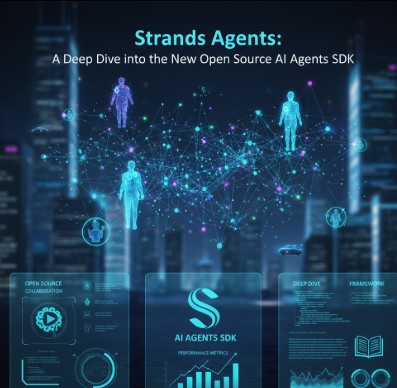The world of artificial intelligence is experiencing a seismic shift. We are moving beyond simple, request-response models to a new paradigm of autonomous, goal-oriented systems known as AI agents. These agents can reason, plan, and interact with their environment to accomplish complex tasks, promising to revolutionize industries from software development to scientific research. However, building, deploying, and managing these sophisticated systems is fraught with challenges. Developers grapple with state management, observability, and the sheer complexity of creating robust, production-ready agents. This is where Strands Agents enters the scene, offering a powerful new framework designed to address these very problems. This article provides a comprehensive exploration of Strands, a modular and event-sourced framework that simplifies the creation of powerful Open Source AI Agents.
Table of Contents
What Are AI Agents and Why is the Ecosystem Exploding?
Before diving into Strands, it’s crucial to understand what an AI agent is. At its core, an AI agent is a software entity that perceives its environment, makes decisions, and takes actions to achieve specific goals. Unlike traditional programs that follow a rigid set of instructions, AI agents exhibit a degree of autonomy. This new wave of agents is supercharged by Large Language Models (LLMs) like GPT-4, Llama 3, and Claude 3, which serve as their cognitive engine.
Key Components of a Modern AI Agent
Most modern LLM-powered agents are built around a few core components:
- Cognitive Core (LLM): This is the “brain” of the agent. The LLM provides reasoning, comprehension, and planning capabilities, allowing the agent to break down a high-level goal into a series of executable steps.
- Tools: Agents need to interact with the outside world. Tools are functions or APIs that grant the agent specific capabilities, such as searching the web, accessing a database, sending an email, or executing code.
- Memory: To maintain context and learn from past interactions, agents require memory. This can range from short-term “scratchpad” memory for the current task to long-term memory stored in vector databases for recalling vast amounts of information.
- Planning & Reflection: For complex tasks, agents must create a plan, execute it, and then reflect on the outcome to adjust their strategy. This iterative process is key to their problem-solving ability.
The explosive growth in this field, as detailed in thought pieces from venture firms like Andreessen Horowitz, is driven by the immense potential for automation. Agents can function as autonomous software developers, tireless data analysts, or hyper-personalized customer service representatives, tackling tasks that were once the exclusive domain of human experts.
Introducing Strands: The Modular Framework for Open Source AI Agents
While the promise of AI agents is enormous, the engineering reality of building them is complex. This is the gap that Strands aims to fill. Strands is a Python-based Software Development Kit (SDK) designed from the ground up to be modular, extensible, and, most importantly, production-ready. Its unique architecture provides developers with the building blocks to create sophisticated agents without getting bogged down in boilerplate code and architectural plumbing.
Core Concepts of Strands
Strands is built on a few powerful, interconnected concepts that set it apart from other frameworks. Understanding these concepts is key to harnessing its full potential.
Agents
The Agent is the central orchestrator in Strands. It is responsible for managing the conversation flow, deciding when to use a tool, and processing information. Strands allows you to easily initialize an agent with a specific LLM, a set of tools, and a system prompt that defines its persona and objectives.
Tools
Tools are the agent’s hands and eyes, enabling it to interact with external systems. In Strands, creating a tool is remarkably simple. You can take almost any Python function and, with a simple decorator, turn it into a tool that the agent can understand and use. This modular approach means you can build a library of reusable tools for various tasks.
Memory
Strands provides built-in mechanisms for managing an agent’s memory. It automatically handles conversation history, ensuring the agent has the necessary context for multi-turn dialogues. The framework is also designed to be extensible, allowing for the integration of more advanced long-term memory solutions like vector databases for retrieval-augmented generation (RAG).
Events & Event Sourcing
This is arguably the most powerful and differentiating feature of Strands. Instead of just managing the current state, Strands is built on an event-sourcing architecture. Every single thing that happens during an agent’s lifecycle—a user message, the agent’s thought process, a tool call, the tool’s response—is captured as a discrete, immutable event. This stream of events is the single source of truth.
The benefits of this approach are immense:
- Complete Observability: You have a perfect, step-by-step audit trail of the agent’s execution. This makes debugging incredibly easy, as you can see the exact reasoning process that led to a specific outcome.
- Replayability: You can replay the event stream to perfectly reconstruct the agent’s state at any point in time, which is invaluable for testing and troubleshooting.
- Resilience: If an agent crashes, its state can be rebuilt by replaying its events, ensuring no data is lost.
Getting Started: Building Your First Strands Agent
One of the best features of Strands is its low barrier to entry. You can get a simple agent up and running in just a few minutes. Let’s walk through the process step by step.
Prerequisites
Before you begin, ensure you have the following:
- Python 3.9 or higher installed.
- An API key for an LLM provider (e.g., OpenAI, Anthropic, or Google). For this example, we will use OpenAI. Make sure to set it as an environment variable:
export OPENAI_API_KEY='your-api-key'. - The
pippackage manager.
Installation
Installing Strands is a one-line command. Open your terminal and run:
pip install strands-agents
A Simple “Hello, World” Agent
Let’s create the most basic agent possible. This agent won’t have any tools; it will just use the underlying LLM to chat. Create a file named basic_agent.py.
from strands_agents import Agent
from strands_agents.models.openai import OpenAIChat
# 1. Initialize the LLM you want to use
llm = OpenAIChat(model="gpt-4o")
# 2. Create the Agent instance
agent = Agent(
llm=llm,
system_prompt="You are a helpful assistant."
)
# 3. Interact with the agent
if __name__ == "__main__":
print("Agent is ready. Type 'exit' to end the conversation.")
while True:
user_input = input("You: ")
if user_input.lower() == "exit":
break
response = agent.run(user_input)
print(f"Agent: {response}")
When you run this script (python basic_agent.py), you can have a direct conversation with the LLM, but orchestrated through the Strands framework. All interactions are being captured as events behind the scenes.
Adding a Tool: A Practical Example
The real power of agents comes from their ability to use tools. Let’s create a simple tool that gets the current weather for a specific city. We’ll use a free weather API for this (you can find many online).
First, create a file named tools.py:
import requests
from strands_agents import tool
# For this example, we'll mock the API call, but you could use a real one.
# import os
# WEATHER_API_KEY = os.getenv("WEATHER_API_KEY")
@tool
def get_current_weather(city: str) -> str:
"""
Gets the current weather for a given city.
Returns a string describing the weather.
"""
# In a real application, you would make an API call here.
# url = f"https://api.weatherapi.com/v1/current.json?key={WEATHER_API_KEY}&q={city}"
# response = requests.get(url).json()
# return f"The weather in {city} is {response['current']['condition']['text']}."
# For this example, we'll return a mock response.
if "tokyo" in city.lower():
return f"The weather in {city} is sunny with a temperature of 25°C."
elif "london" in city.lower():
return f"The weather in {city} is cloudy with a chance of rain and a temperature of 15°C."
else:
return f"Sorry, I don't have weather information for {city}."
Notice the @tool decorator. This is all Strands needs to understand that this function is a tool, including its name, description (from the docstring), and input parameters (from type hints). Now, let’s update our agent to use this tool. Create a file named weather_agent.py.
from strands_agents import Agent
from strands_agents.models.openai import OpenAIChat
from tools import get_current_weather # Import our new tool
# 1. Initialize the LLM
llm = OpenAIChat(model="gpt-4o")
# 2. Create the Agent instance, now with a tool
agent = Agent(
llm=llm,
system_prompt="You are a helpful assistant that can check the weather.",
tools=[get_current_weather] # Pass the tool in a list
)
# 3. Interact with the agent
if __name__ == "__main__":
print("Weather agent is ready. Try asking: 'What's the weather in London?'")
while True:
user_input = input("You: ")
if user_input.lower() == "exit":
break
response = agent.run(user_input)
print(f"Agent: {response}")
Now, when you run this new script and ask, “What’s the weather like in Tokyo?”, the agent will recognize the intent, call the get_current_weather tool with the correct argument (“Tokyo”), receive the result, and formulate a natural language response for you.
Frequently Asked Questions
Is Strands Agents completely free to use?
Yes, the Strands Agents SDK is completely free and open-source, distributed under the permissive Apache 2.0 License. This means you can use, modify, and distribute it for personal or commercial projects without any licensing fees. However, you are still responsible for the costs associated with the third-party services your agent uses, such as the API calls to LLM providers like OpenAI or cloud infrastructure for hosting.
How does Strands compare to other frameworks like LangChain?
Strands and LangChain are both excellent frameworks for building LLM applications, but they have different philosophical approaches. LangChain is a very broad and comprehensive library that provides a vast collection of components and chains for a wide range of tasks. It’s excellent for rapid prototyping and experimentation. Strands, on the other hand, is more opinionated and architecturally focused. Its core design around event sourcing makes it exceptionally well-suited for building production-grade, observable, and debuggable agents where reliability and auditability are critical concerns.
What programming languages does Strands support?
Currently, Strands Agents is implemented in Python, which is the dominant language in the AI/ML ecosystem. The core architectural principles, particularly event sourcing, are language-agnostic. While the immediate focus is on enriching the Python SDK, the design allows for potential future expansion to other languages. You can find the source code and contribute on the official Strands GitHub repository.
Can I use Strands with open-source LLMs like Llama 3 or Mistral?
Absolutely. Strands is model-agnostic. The framework is designed to work with any LLM that can be accessed via an API. While it includes built-in wrappers for popular providers like OpenAI and Anthropic, you can easily create a custom connector for any open-source model you are hosting yourself (e.g., using a service like Ollama or vLLM) or accessing through a provider like Groq or Together.AI. This flexibility allows you to choose the best model for your specific use case and budget.

Conclusion
The age of autonomous AI agents is here, but to build truly robust and reliable systems, developers need tools that go beyond simple scripting. Strands Agents provides a solid, production-focused foundation for this new era of software development. By leveraging a modular design and a powerful event-sourcing architecture, it solves some of the most pressing challenges in agent development: state management, debugging, and observability.
Whether you are a developer looking to add intelligent automation to your applications, a researcher exploring multi-agent systems, or an enterprise architect designing next-generation workflows, Strands offers a compelling and powerful framework. As the landscape of AI continues to evolve, frameworks that prioritize stability and maintainability will become increasingly vital. By embracing a transparent and resilient architecture, the Strands SDK stands out as a critical tool for anyone serious about building the future with Open Source AI Agents. Thank you for reading the DevopsRoles page!
